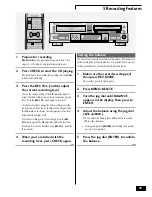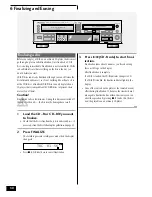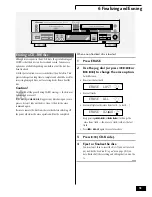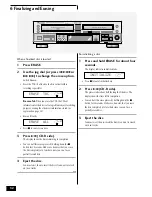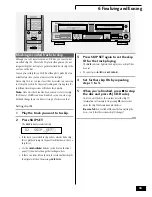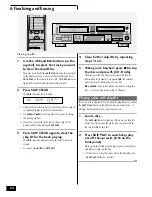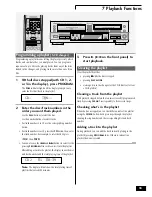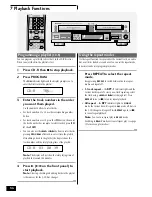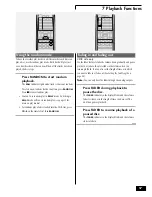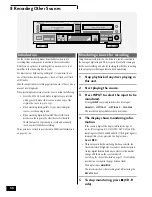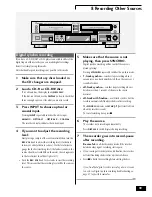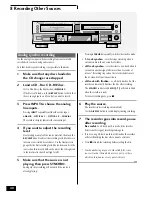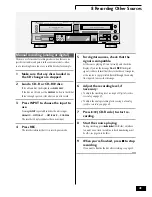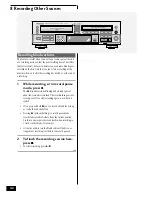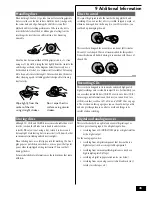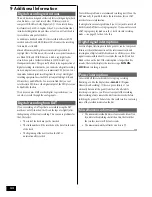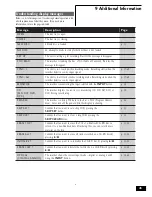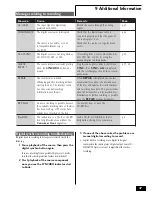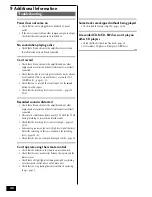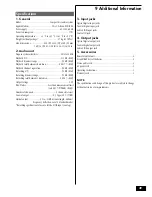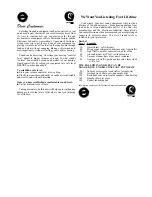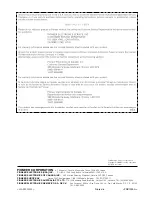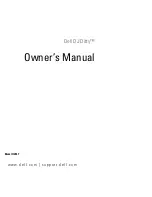
43
9 Additional Information
Storing discs
Although CD, CD-R and CD-RW discs are more durable than vinyl
records, you should still take care to handle and store discs
correctly. When you're not using a disc, return it to its case and
store upright. Avoid leaving discs in excessively cold, humid, or hot
environments (including under direct sunlight).
When labeling discs, use a felt-tip pen sold for marking CDs. Don't
glue paper or put stickers onto the disc, or use a pencil, ball-point
pen or other sharp-tipped writing instrument. These could all
damage the disc.
For more detailed care information see the instructions that come
with discs.
Handling discs
When holding CDs of any type, take care not to leave fingerprints,
dirt or scratches on the disc surface. Hold the disc by its edge or by
the center hole and edge. Damaged or dirty discs can affect
playback and/or recording performance. Take care also not to
scratch the label side of the disc. Although not as fragile as the
recording side, scratches can still result in a disc becoming
unusable.
Should a disc become marked with fingerprints, dust, etc., clean
using a soft, dry cloth, wiping the disc lightly from the center to the
outside edge as shown in the diagram below. If necessary, use a
cloth soaked in alcohol, or a commercially available CD cleaning
kit to clean a disc more thoroughly. Never use benzine, thinner or
other cleaning agents, including products designed for cleaning
vinyl records.
Wipe lightly from the
center of the disc
using straight strokes.
Don’t wipe the disc
surface using circular
strokes.
Discs to avoid
CDs spin at high speed inside the recorder during playback and
recording. If you can see that a disc is cracked, chipped, warped, or
otherwise damaged, don't risk using it in your CD recorder—you
could end up damaging the unit.
Recording CDs
This recorder is designed to let you make extremely high quality
digital recordings onto recordable compact discs. For flexibility, you
can use either rewritable discs (CD-RW) or write-once discs (CD-R).
For more general information on the discs you can and can’t use
with this recorder, see
About CD, CD-R and CD-RW Discs
on page
6. The overview on these pages gives you an idea of what's possible,
and also provides guidance on what to avoid and things to be
careful of when recording.
Digital and analog sources
This recorder has both an optical and a coaxial digital input, as
well as a pair of analog inputs. Use a digital input when:
• recording from a CD/MD/DAT/DCC player or digital satellite
with a digital output.
Use the analog inputs when:
• recording from a digital component that does not have a
digital output (such as some portable equipment).
• recording from an incompatible digital source (such as a
high sampling-rate DAT tape).
• recording a digital copy-protected source (see below).
• recording from any analog source (radio broadcasts, vinyl
records, cassette tapes, etc.).
This recorder is designed for use with conventional, fully circular
CDs only. Use of shaped CDs is not recommended for this product.
Pioneer disclaims all liability arising in connection with the use of
shaped CDs.
Содержание PDR-W37 Elite
Страница 1: ...COMPACT DISC RECORDER MULTI CD CHANGER PDR W37 Operating Instructions ...
Страница 51: ......

